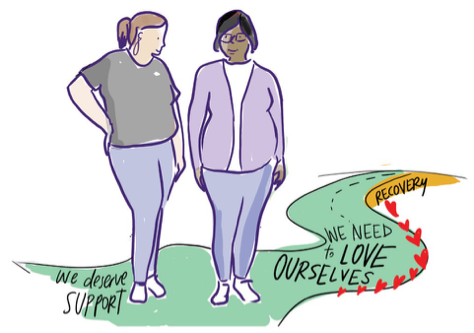Guest blog by Elizabeth Sinclair Hancq, Director of Research, Treatment Advocacy Center.
Severe mental illness, including schizophrenia, severe bipolar disorder, and major depression with psychotic features, impacts 8.8 million adults in the United States. Approximately half of these individuals receive no treatment in a given year.
There are important sex differences between men and women with severe mental illness. Women tend to have a later age of onset of the illness, developing symptoms for bipolar disorder or schizophrenia in their late 20s, compared to early 20s in men. Symptoms of the disorders, such as hallucinations, delusions, or flat affect, which causes people to not be able to express emotions or understand emotions in other people, may present differently in women compared to men, and women may have different side effects from the medications that are used to treat severe mental illness. Additionally, having a severe mental illness has important implications for women’s health issues, such as in reproductive health, where symptoms of schizophrenia and bipolar disorder may change over the course of a woman’s menstrual cycle, during pregnancy, or after menopause.
In 2016, Treatment Advocacy Center published the report “10 Ways Women with Serious Mental Illness Are Overrepresented. Underserved,” which presented the ways in which women with serious mental illness disproportionately experience negative outcomes compared with men with the same disorders and women without serious mental illness. However, missing from this research base is information about how women themselves feel about their illness and how it impacts their lives. Too often, research is conducted on and about people, rather than inclusive of the people being studied.
Treatment Advocacy Center remedied this research gap by conducting focus group interviews to hear directly from women with severe mental illness about the unique experiences, challenges, and barriers they face in achieving the lives they want. A graphic recorder was present for the focus group discussions to create a visual representation of the results and capture the conversations in a way that simple data representations and other qualitative methods cannot. The result of these interviews, “Listen to Us: The Unique Experience of Women with Severe Mental Illness,” was published by Treatment Advocacy Center this week.
The results of the study indicate that women with severe mental illness face compound marginalization because of their gender, mental illness and the stigma, social isolation, and disparate treatment that comes from belonging to a marginalized group. There are larger barriers to treatment for women with severe mental illness than for men with the same disorders, due to women’s symptoms being taken less seriously as well as system capacity disparities, such as less access to inpatient psychiatric beds. Additionally, social isolation and relationship challenges are very common problems for women with severe mental illness and are often ignored. There is much to learn by listening to women; their experiences can help inform solutions that address these disparities.
Based on the research report, identified below are three research areas deserving the most priority:
- New and Improved Clinical Treatments
The differences by sex among people with severe mental illness are likely a result of estrogen. Research indicates that estrogen is protective for psychotic symptoms, and, conversely, that reductions in estrogen can worsen or precipitate psychosis. This also may explain why some women develop psychosis after terminating a pregnancy or giving birth, when estrogen levels are reduced. Estrogen treatments are being explored for women with psychotic disorders, but before these treatments are incorporated into clinical care, more research into reducing side effect risks of cancer development with this hormone treatment is needed. - Pregnancy and Postpartum Care
Treatment Advocacy Center’s research found that motherhood is a complicated topic among women with severe mental illness, with some finding motherhood fulfilling and helpful to their recovery, and others expressing concern about passing on their genes to any children or feeling that the burden of their illness coupled with being a mother is too much. Another complication for women with severe mental illness in making the decision to become a mother is the potential risk of their antipsychotic medications on the fetus during pregnancy, or in the infant when breastfeeding. Additionally, there is an increased risk of developing postpartum psychosis in individuals with severe mental illness. Research into new treatments for women with severe mental illness from pregnancy through the postpartum period would help ensure that no one has to choose between their mental health and their desire to become a mother. - Suicide Risk
While less women die by suicide, women with severe mental illness are two times more likely to have made one suicide attempt and three times more likely to have made two or more suicide attempts compared to men with the same disorders. Other research has suggested that a history of pregnancy-related mental illness is associated with an increased risk for self-harm in these women. More research is needed to understand sex differences in suicidal behaviors among people with severe mental illness in order to prevent these tragedies.If you or someone you know may be struggling with suicidal thoughts, you can call the U.S. National Suicide Prevention Lifeline at 9-8-8 any time day or night, or chat online.
The full “Listen to Us” report can be accessed here. Learn more about Treatment Advocacy Center’s work at www.treatmentadvocacycenter.org.
